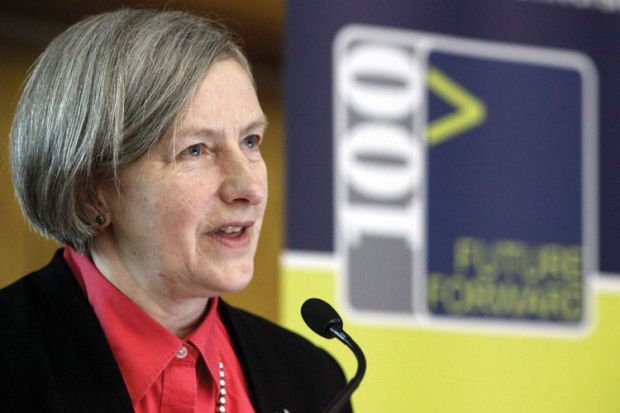Source: The Association of Commonwealth Universities
‘Wisdom and understanding’: Madeleine Atkins brings a wealth of experience
The vice-chancellor of Coventry University is to become the Higher Education Funding Council for England’s first female chief executive.
Madeleine Atkins will succeed Sir Alan Langlands, who will step down on 1 October to become vice-chancellor of the University of Leeds.
Hefce chair Tim Melville-Ross said Professor Atkins had been the unanimous choice of the funding council’s board and he praised her “expertise, wisdom and understanding”.
Universities and science minister David Willetts told Times Higher Education he was happy to confirm her appointment, pointing to her “breadth of her experience”, which includes membership of the Hefce board since 2009 and senior governance roles at the Association of Commonwealth Universities, the National Endowment for Science, Technology and the Arts and the Council for Industry and Higher Education.
He also highlighted her experience of a range of universities; she has an undergraduate degree from the University of Cambridge, a PhD from the University of Nottingham and has worked in a variety of senior roles at Newcastle University.
He said she had done an “excellent job” at Coventry, which she has led since 2004, and was “well regarded by her fellow vice-chancellors”. She is notable for responding to the coalition government’s tripling of the ceiling on tuition fees by pioneering a low-cost alternative to mainstream higher education at spin-off institution Coventry University College.
Her research interest in the use of new technology to support learning would “stand her in very good stead given the emergence of Moocs [massive open online courses]”, Mr Willetts added.
He said she had prevailed in a “strong field” of vice-chancellors who wanted the job, and he rejected suggestions that Hefce’s role had been diminished by the removal of most of its teaching funding.
His recently announced intention to see the body wield power via its remit to “designate” courses and institutions for Student Loans Company funding would ensure that Hefce continued to be “absolutely at the centre of the regime for higher education in England”. It also remained his intention ultimately to legislate to give it “explicit” regulatory powers.
All five of Hefce’s previous executives since its foundation in 1992 have been male and a female appointment was widely anticipated. Mr Willetts said Professor Atkins was chosen on merit, “but we are very aware of the importance of diversity and appointing the first woman is a bonus”.
Professor Atkins, whose start date has yet to be confirmed, said her aim would be to promote “an internationally renowned sector which advances research and promotes social and economic prosperity for the benefit of students and the wider community”.
Register to continue
Why register?
- Registration is free and only takes a moment
- Once registered, you can read 3 articles a month
- Sign up for our newsletter
Subscribe
Or subscribe for unlimited access to:
- Unlimited access to news, views, insights & reviews
- Digital editions
- Digital access to THE’s university and college rankings analysis
Already registered or a current subscriber? Login




